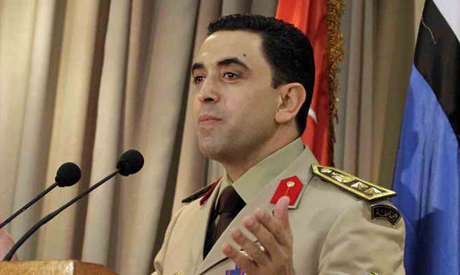The Cairo Institute for Human Rights Studies (CIHRS) has criticised many articles of the draft constitution just two days before Egyptians head to the polls in a referendum on the document. The group also said it “is extremely concerned by the failure of two attempts in one year” to draft a constitution that “lives up to the sacrifices made by the Egyptian people before and after the 25 January uprising.”
The NGO published a statement on Sunday both questioning the clarity and expressing its rejection of various articles included in the draft constitution. CIHRS pointed out that it believes some provisions, including the chapter on rights and liberties, are better than in the 2012 constitution. However, the group stressed, “the 2013 draft constitution does not provide for a political system that will guarantee and protect rights and liberties it ostensibly recognises from violations” arising from harmful legislation or “attacks by the security apparatus.”
CIHRS highlighted its rejection of Article 204, which relates to the military trial of civilians, saying that it “rejects the demands of the long, hard-fought campaign against theses unfair trials.” The NGO said that “the changes are merely cosmetic,” and “fail to meet the most basic standards of independence and fairness.” CIHRS also decried Articles 201 and 234, which ensure that the Minister of Defence is chosen from within the military and, for the next two presidential terms, that this choice will be made by the Supreme Council of the Armed Forces. It says this provision “upends civilian-military relations and makes the military establishment equal and parallel to the elected civilian authority.”
The group accused the fifty-member Constituent Assembly that drafted the constitution of only meeting “the demands of state institutions… to the exclusion of all other stakeholders”. It added that the draft “allows major state apparatuses virtually [sic] autonomy, thus threatening state sovereignty and stability”.
CIHRS also expressed concern over articles relating to religion, including Article 7, which it believes “allows for possible interference by Al-Azhar in the legislative process”. The group pointed out that while Article 3 allows freedom of worship for Muslims, Christians and Jews, it “ignores the existence of other religious minorities and communities in Egypt while also establishing multiple parallel legal systems, a sharp departure from the norm for modern states.”
The NGO welcomed the removal of “the problematic provisions proposed by Salafis” that existed in the 2012 constitution relating to the preservation of traditions and values of the family. However, CIHRS said “the text that remains is still vague and overly florid.” The group also highlighted that the term ‘national security’ “is left undefined”, adding that the preservation of national security is “the task of the security establishment.”
CIHRS expressed concerns over freedom of expression and other media freedoms. The group points out that one article “will allow legislators and the security apparatus to harass or prosecute bloggers and citizens who express opinions online and in social media that the authorities find troubling.” The NGO believes that the creation of a ‘supreme media council’, as set out in Article 211, is “tasked with ensuring that national security standards are binding on press and media institutions”, believing that this could manifest itself as “the chief means by which the press and media freedoms are suppressed in the name of national security.”
The NGO criticised Egypt’s political actors from the last three years stressing, “Human rights have not been a priority for any of the governments formed since 25 January 2011.” CIHRS added, “Many political actors are quite willing to abandon support for human rights as soon as they succeed in stripping their political opponents of influence or they themselves reach the seat of power.”
Egyptians will vote on the draft constitution over two days beginning Tuesday.


